This guest blog is written by Arizona State University’s Mary Lou Fulton College for Teaching and Learning Innovation.
A distracted, stressed mind is a difficult place for learning to take root. Yet, in classrooms everywhere, teachers face the daily challenge of helping students tune in and stay engaged.
To help address this, Arizona State University’s Mary Lou Fulton College for Teaching and Learning Innovation — one of the nation’s leading colleges of education — has partnered with the nonprofit America Succeeds to develop a professional learning program called Teaching Durable Skills. The online program, comprised of five courses, is built around 10 essential durable skills identified by America Succeeds and affirmed by educators, including a dedicated course on communication and mindfulness.
While the courses can be taken online anytime, an instructor-led, eight-week course focusing on communication and mindfulness begins Feb. 24 and sign up is now open. During the Teaching Durable Skills: Communication and Mindfulness course educators can expect to:
Learn how to strengthen students’ communication skills
Students need strong communication skills to express their thoughts, ask questions, and engage in discussions. This course helps educators refine their own communication strategies while fostering student expression and active listening. Topics covered in the communication module include:
- Effective verbal and written communication
- Public speaking and negotiation
- Social media and multilingual communication
- Relationship building through dialogue
Learn how to strengthen students’ mindfulness skills
Mindfulness helps students regulate emotions, manage stress, and stay present in learning. Research highlights its role in improving attention and fostering a positive classroom dynamic. Topics covered in the mindfulness module include:
- Emotional regulation and focus
- Mindful listening and communication
- Stress management techniques
- Real-world mindfulness applications
Integrate approaches that strengthen these skills collectively.
These skills enhance one another, as mindful students communicate more effectively, and strong communicators are better equipped to engage in mindfulness practices. This fully online communication and mindfulness course emphasizes exercises that help educators assess their personal communication styles and develop familiarity with mindfulness techniques.
The course’s content includes videos, articles, resources, purposeful reflections, and structured activities. Many of the resources used in the course come from MLFC’s institutional expertise and resources, including its Center for Whole-Child Education and the Principled Innovation® initiative. Through student observations, participants apply these insights to analyze classroom interactions. By the end of the course, educators will be equipped to actively foster and integrate communication and mindfulness in their learning environments.
The Feb. 24 facilitated course includes several group learning activities at a fixed time, led by the instructor.
Immediately apply these approaches in learning environments
The communications and mindfulness course culminates in a final project where educators integrate both skills into their teaching, or similar education exercises for immediate classroom application. The final project options include:
- Lesson Plan Development – Incorporate both competencies into a lesson.
- Faculty Training Module – Create professional development materials.
- Project-Based Learning – Design a classroom project applying both skills.
- Community Engagement Initiative – Partner with local organizations for experiential learning.
By applying these communication and mindfulness approaches, educators can have an immediate impact in the classroom while also preparing their students for a changing world where such skills are in-demand. Educators can also continue learning through additional modules that focus on the eight other durable skills identified as: Collaboration, critical thinking, creativity, fortitude, growth mindset, metacognition, character, and leadership.
For future facilitated courses sessions, districts and other organizations are encouraged to contact the course organizers (asuprofessionallearning@asu.edu).
Want to learn more about durable skills that can support your students’ learning?
Take this one-hour introductory micro-course (called a PowerUp), at no cost, that provides an overview of all 10 durable skills and how they can be integrated into coursework and lessons: Intro to Durable Skills PowerUp.




